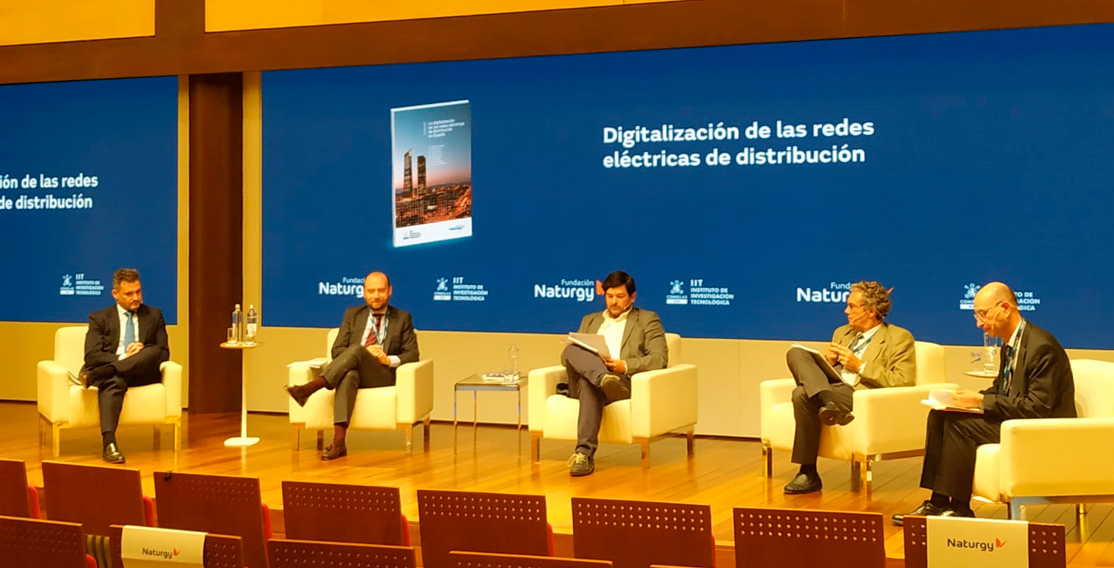Spain must drive the digitalisation of its electricity networks to contribute to decarbonisation of the energy system
Spain is one of the best-positioned countries in Europe in the installation of smart meters, but the digitalisation of the electrical grid is still not enough to integrate the new resources and all the participants in the system.

The digitalisation of the electrical distribution grid will facilitate user participation in decarbonisation and guarantee supply more simply, reducing power cuts and maintenance time. However, progress on this process in Spain is still too slow to operate a network with mass additions of distributed energy resources and to integrate all the participants into the system.
This is one of the theories of the report ‘Digitisation of electrical distribution networks in Spain’ by the Comillas Pontifical University Institute for Research in Technology (IIT). The document emphasises the need for all players in the system, from distribution companies and consumers to demand aggregators and distributed generation, to get involved in this transformation process and make a decisive contribution to decarbonising the energy system.
The authors of the document, published by the Naturgy Foundation, state that “the electrical distribution networks continue to be under-automated compared to the infrastructure associated with other industries,” even though Spain is one of the most advanced countries in the installation of smart meters.
“It appears that practically all domestic consumers in Spain supplied by a distributor with over 100,000 customers already have smart meters,” while Germany has yet to install them, and Italy, which pioneered them in Europe, is already planning the rollout of the second generation, explains Tomás Gómez, professor at IIT Comillas Pontifical University and co-author of the study. With smart meter installation practically complete, Spain leads the way with Italy and the Scandinavian countries.
“Although the rollout of smart meters in Spain gave a major boost to digitalisation, their connectivity still needs to be improved, so they can be used in real-time or short-term operations in the network. Without forgetting this almost real-time operation needs high capacity communications,” adds Gómez.
One of the main difficulties facing electricity distribution is its scope compared to other electrical infrastructure. The report highlights the difference between rural and urban areas: while in the former connectivity may be poor, in the latter, “even though they typically have better connectivity, the distribution network is usually underground, which makes it difficult to have wireless coverage.”
The report maintains that there are considerable benefits to digitalisation and it will speed up the energy transition, but there are also many challenges. According to Gómez “the digitalisation of distribution networks is not straightforward: their size, regulation, the maturity of the technology, and cybersecurity are some of the factors to be taken into account.”
Improving digital skills
Improving digital skills and a better digital culture in distribution companies are other challenges to digitalisation, not just for management but also in terms of cybersecurity, given the critical nature of this infrastructure and its geographical dispersion,” adds Gómez. “Digitalisation requires workers with new skills and know-how. Specialist training is needed at every education level, and ongoing training to adapt to changes in technology.”
In the context of digitalisation, cybersecurity becomes very important. However, “there is still a long way to go to establish the mechanisms which will enable distribution companies and regulators to correctly assess the risks associated with cybersecurity, and the costs and benefits associated with improvements in this area,” Gómez explains.
There are also difficulties when assessing the costs of digitalisation. “Distribution companies often have to evaluate the rollout of technologies or solutions which are still in development,” to which we can add the possibility of early obsolescence after the investment is made.
Also, the digital transformation of the electricity distribution system cannot be implemented overnight, as it would be extremely disruptive. According to Gómez, “this gradual implementation is also largely due to the sector being regulated, meaning that digitalisation poses a series of regulatory needs which must be addressed.
The 2019 EU Clean Energy Package included aspects relating to network digitalisation, but Spain is still awaiting various legislative developments and changes before it can set guidelines which will really drive digitised distribution networks and active users.”
Digitalisation and smart meters also play a key role in the implementation of self-consumption facilities, whether individual or shared, and the energy communities provided for in the European Directive. Managing the data provided by millions of smart meters is also very important, both in the retail market and for efficient network management.
The report was presented today in a webinar with the participation of Carlos Redondo, deputy director general of Electricity at MITECO; Guillermo Amann, president of the Spanish Association of Electrical Equipment Manufacturers (AFBEL); and Raúl Suárez, director of Electrical Networks Spain at UFD.
Redondo remarked that “digitalisation is not an end in itself, it is working towards the transformation of the electrical system,” adding that the connection capacity of the networks must be increased and the role of the consumer will have to change. To drive investments, he announced that in the coming weeks the Government will publish a Royal Decree to assign the European funds, with a flexible mechanism for allocating grants.
Meanwhile, Suárez explained that “digitalisation will enable distributors to optimise the life cycle of the structure and the business, making it more flexible and autonomous, turning our physical network into a virtual platform and integrating the consumer as another player.” Suárez emphasised that digitalisation will generate savings for the system in environmental and economic terms, and highlighted Spanish leadership, as shown by “the installation of smart meters shows, which we completed in Spain three years ago.”
Amann said that Spain has a manufacturing sector which is “very strong technologically and with a productive capacity to compete worldwide”, and that “electricity companies have been very sensitive during the pandemic and have continued to invest in the networks, enabling the manufacturing sector to overcome the industrial problems arising from the crisis.”
Share